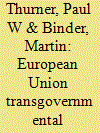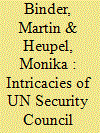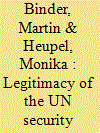| Srl | Item |
| 1 |
ID:
086753


|
|
|
|
|
| Publication |
2009.
|
| Summary/Abstract |
Does the European Union (EU) represent a new political order replacing the old nation-states? The assessment of the real character of political orders requires the identification of political key actors and of the specific structure of their interactions. Transgovernmental networks have been considered to be one of the most important features of EU integration. Unfortunately, the network structures, processes and the impact of these informal horizontal inter-organisational relations between nation-states are mostly unknown. The main objective of this article is to measure and explain the selective pattern of informal bilateral relations of high officials of the EU Member States' ministerial bureaucracies on the occasion of an EU Intergovernmental Conference. The quantitative data used rely on standardised interviews with 140 top-level bureaucrats. The statistical estimation of network choices is based on recent developments of exponential random graph models.
|
|
|
|
|
|
|
|
|
|
|
|
|
|
|
|
| 2 |
ID:
178965


|
|
|
|
|
| Summary/Abstract |
The only way forward would be a grand bargain under which actors holding maximalist positions gave them up and agreed to a ‘reforms lite’ compromise.
|
|
|
|
|
|
|
|
|
|
|
|
|
|
|
|
| 3 |
ID:
139526


|
|
|
|
|
| Summary/Abstract |
Existing research on the legitimacy of the UN Security Council is conceptual or theoretical, for the most part, as scholars tend to make legitimacy assessments with reference to objective standards. Whether UN member states perceive the Security Council as legitimate or illegitimate has yet to be investigated systematically; nor do we know whether states care primarily about the Council's compliance with its legal mandate, its procedures, or its effectiveness. To address this gap, our article analyzes evaluative statements made by states in UN General Assembly debates on the Security Council, for the period 1991–2009. In making such statements, states confer legitimacy on the Council or withhold legitimacy from it. We conclude the following: First, the Security Council suffers from a legitimacy deficit because negative evaluations of the Council by UN member states far outweigh positive ones. Nevertheless, the Council does not find itself in an intractable legitimacy crisis because it still enjoys a rudimentary degree of legitimacy. Second, the Council's legitimacy deficit results primarily from states' concerns regarding the body's procedural shortcomings. Misgivings as regards shortcomings in performance rank second. Whether or not the Council complies with its legal mandate has failed to attract much attention at all.
|
|
|
|
|
|
|
|
|
|
|
|
|
|
|
|
| 4 |
ID:
142039


|
|
|
|
|
| Summary/Abstract |
Over the past two decades, the United Nations Security Council has responded more strongly to some humanitarian crises than to others. This variation in Security Council action raises the important question of what factors motivate United Nations intervention. This article offers a configurational explanation of selective Security Council intervention that integrates explanatory variables from different theories of third-party intervention. These variables are tested through a comparison of 31 humanitarian crises (1991–2004) using fuzzy-set qualitative comparative analysis. The analysis shows that a large extent of human suffering and substantial previous involvement in a crisis by international institutions are the key explanatory conditions for coercive Security Council action, but only when combined with negative spillover effects to neighboring countries (path 1) or with low capabilities of the target state (path 2). These results are highly consistent and explain 85% of Security Council interventions after the end of the Cold War. The findings suggest that the Council’s response to humanitarian crises is not random, but follows specific patterns that are indicated by a limited number of causal paths.
|
|
|
|
|
|
|
|
|
|
|
|
|
|
|
|